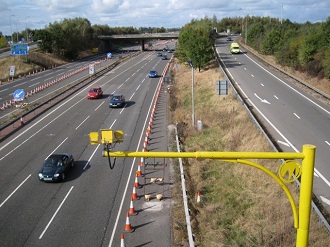Smart Motorways Rack Up £450,000 From Speeding Fines: Are You Next?
Smart Motorways Rack Up £450,000 From Speeding Fines: Are You Next?

Latest figures suggest more than 1,000 are caught speeding every week following the introduction of smart motorways.
A BBC investigation found that in 2015, over 52,000 drivers were issued fixed penalties on 11 stretches of the motorway including M1, M25 and M6. In comparison to 2011, only 2,023 drivers were caught on the same stretches- before the upgrade to smart motorways (Department for Transport).
On the M1 motorway in Nottingham, police issued 8,489 tickets; an equivalent of nearly £450,000 worth of fines. That meant the revenue going to the government was more than £1.1m compared to five years ago. However the government insists the smart network is used to increase motorway safety, not revenue.
The £6 billion pound investment has resulted in the “safest motorways on the network and [is] not used to generate revenue” says Shaun Pidcock, a spokesman for Department of Transport.
(Photo attribution: Robin Stott [CC BY-SA 2.0 (http://creativecommons.org/licenses/by-sa/2.0)], via Wikimedia Commons)
What is a smart motorway?
Smart motorways increase the capacity of the road by opening the hard shoulder to traffic without the hassle of widening the road. They are operated by Highways England which monitors traffic flow carefully and can activate, change signs and speed limits.
A spokesman for the Department of Transport said: “smart motorways smooth traffic flow and cut congestion for millions of motorists, with evidence from trials showing they are just as safe as regular motorways.”
Already, almost 240 miles of motorways in England have been incorporated into smart motorways and a further 200 miles are currently either planned or under-construction.
For speeding drivers, it means there is a higher risk of being caught. This can result in an immediate fine and points on your license.
Depending on the speeding offence, motorists are offered the chance to attend a speed awareness course – if slightly over the legal speed limit. However drivers cannot attend more than one course every three years and if you are caught again in that time points will be added to your license.
If you are convicted of a driving offence or obtain more than 12 points on your license within three years, you could receive a driving ban. For new drivers, if you obtain six points within two of years passing your test, you could receive a driving ban.
How long a driving ban lasts is determined by the courts – based on how serious they think the offence is. If you have 12 or more penalty points within 3 years you could be banned from driving for a minimum of six months.
Contact our speeding and road traffic offences solicitors today
Driving penalties can be costly to your pocket and emotionally draining if you’re summoned to court. The best way to avoid a driving ban altogether is to adhere to speed limits and road signs. However if you are facing any charges relating to speeding, it is important that you get the support that you need from family, friends and even the right legal expert.
At IBB Solicitors we have solicitors who specialise in road traffic law and advise individuals and employers facing charges relating to speeding. Our goal is to help you understand the charges, advance any defence and support you if you go to court.
If you or a family member has been charged with a road traffic offence, we can help. Call our road and driving offences solicitors today on 0330 999 4999 for immediate help. Alternatively, email us at roadtraffic@ibblaw.co.uk or complete our online form.
